| کد مقاله | کد نشریه | سال انتشار | مقاله انگلیسی | نسخه تمام متن |
|---|---|---|---|---|
| 5735478 | 1411866 | 2017 | 28 صفحه PDF | دانلود رایگان |
عنوان انگلیسی مقاله ISI
Depression alters maternal extended amygdala response and functional connectivity during distress signals in attachment relationship
ترجمه فارسی عنوان
افسردگی واکنش آمیگدال گسترش یافته مادران و ارتباطات عملکردی در طول سیگنال های پریشانی در رابطه دلبستگی را تغییر می دهد
دانلود مقاله + سفارش ترجمه
دانلود مقاله ISI انگلیسی
رایگان برای ایرانیان
کلمات کلیدی
موضوعات مرتبط
علوم زیستی و بیوفناوری
علم عصب شناسی
علوم اعصاب رفتاری
چکیده انگلیسی
Maternal attachment-related parenting behaviors require mothers to regulate self-related and child-related distress. Emotion regulation is, in turn, influenced by maternal mood and personal developmental history. In the current study we examined how depressive mood may alter maternal limbic system function and functional connectivity underlying defensive and hedonic motivations. Twenty nine mothers were recruited to undergo a baby-cry task during a functional magnetic resonance imaging (fMRI) scan. Based on self-reported depression symptoms and clinical interview, the participants were grouped as healthy controls (n = 15) and currently depressed (n = 14). In the baby-cry task, 30 s-long auditory stimuli of baby-cry sounds were presented to simulate four conditions: generic baby-cry (Just-Listen), baby-cry as if it were their own child's cry (Your-Baby), baby-cry as if it were themselves (Self), and matched control sounds (Noise). Depressed mothers, as compared to healthy controls, showed greater Self versus Just-Listen responses in left extended amygdala and decreased functional coupling between this left extended amygdala as the seed and nucleus accumbens (NAc) in self-oriented (Self versus Just-Listen) and child-oriented (Your-Baby versus Just-Listen) distress signals. Moreover, the extended amygdala's differential functional connectivity with dorsomedial prefrontal cortex (dmPFC) during the Your-Baby versus Self was increased for depressed mothers and decreased for healthy controls. Thus, depression may affect mothers by increasing baby-cry threat responses and dysregulating associations between threat and heathy child-oriented parenting motivations. These results are discussed in the context of attachment and self-psychology.
ناشر
Database: Elsevier - ScienceDirect (ساینس دایرکت)
Journal: Behavioural Brain Research - Volume 325, Part B, 15 May 2017, Pages 290-296
Journal: Behavioural Brain Research - Volume 325, Part B, 15 May 2017, Pages 290-296
نویسندگان
S. Shaun Ho, James E. Swain,
